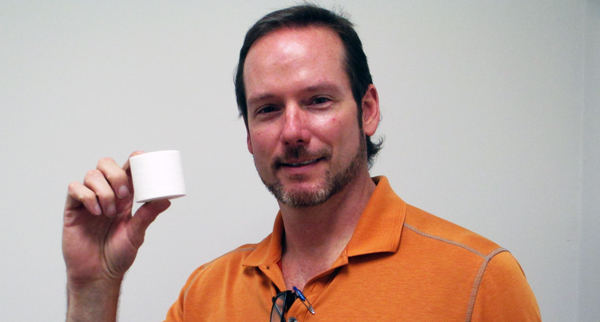Two Chesterfield neighbors and entrepreneurs are sticking with a peculiar liquid to carve out a niche in the athletic gear market.
It was in 2008 when Michael Perez and fellow fantasy football team owner Shawn Holt were tinkering with a milky white emulsion called shear thickening fluid, or S.T.F.
Perez, a mechanical engineer who owns an industrial sealing company in Powhatan, and Holt, a biochemistry teacher at Richard Bland College in Petersburg, were struggling to see how S.T.F. could be used in athletic pads and socks.
Then it hit them.
“I said, ‘Why don’t we put this in athletic tape?’” Perez said. “(Holt) got chills and said, ‘That’s a great idea.’”
After five years, their company Presidium Athletics recently received its first patent for the way it seals S.T.F. into fabric. And the firm has 5,000 rolls of its Impax brand of impact-resistant athletic tape, infused with S.T.F., in production in Taiwan.
Perez, 45, and Holt, 47, describe Impax as a “flexible brace” and are pushing to sell it to university athletic programs as a way to prevent and treat injuries. They hope to retail what they say is a more protective roll of athletic tape for $12.95 each, a higher-end price than the typical roll of athletic tape.
“I’m considering athletic tape obsolete,” Perez said. “(Impax) may be three or four times as expensive, but how much is an injury worth?”
From Roanoke to Atlanta, a five-person Presidium sales team is posing the question to college trainers and coaches in the hope that a prominent Richmond investor’s previous valuation of the company proves to be true.
Presidium’s potential hinges largely on the protective properties of S.T.F., a liquid that’s easy to shape like clay but with a surface that hardens as it moves. That causes it to stiffen depending on the force, but then regain its flexibility.
Illustrating those properties, Perez said it takes about eight layers of Kevlar fiber to stop a bullet from penetrating the skin. It only takes four layers when the fiber is infused with S.T.F.
When Holt isn’t lecturing on biochemistry, he’s on the sidelines coaching youth soccer. In 2009, the father of one of his players mentioned to a neighbor the tape Holt and Perez had developed. That neighbor turned out to be Rick Sharp, the former CEO of Circuit City, a founder of CarMax and the managing director of local venture capital firm V-Ten Capital Partners.
Sharp wanted to hear more, so the Presidium team made a pitch of the product to V-Ten.
“We gave the tape to investors and had them wrap it around their knuckles and bang on the walls,” Perez said.
The tape hardened on impact as promised and V-Ten, at the time, assessed the value of the company at $1 million, Perez said. The investment firm would eventually pour $300,000 into Presidium and own 30 percent of the company.
With the help of V-Ten, Perez and Holt struck a deal in June 2012 with the University of Delaware, which owns a number of patents for S.T.F. The deal lets Presidium use S.T.F. in fabrics, while the University of Delaware gets a 5 percent royalty on Presidium’s net sales.
Presidium hired Virginia Beach-based O’Brien et al. Advertising to develop what would become the Impax brand.
Perez and Holt traveled to Taiwan to talk to manufacturers. They developed prototypes and tested their products at the Virginia BioTechnology Center at 800 E. Leigh St.
Perez said Sharp owned a stake in a golf company and steered Presidium toward developing anti-vibration golf grips. Perez and Holt eventually developed D-Flex golf strips, which they hope to retail for about $20.
The pair will face competition on the market of higher-end athletic tape. Beginning in 2009, there was a spike in sales of kinesiology tape – brightly colored tape that’s supposed to ease pain and pressure on strained muscles. Rolls of kinesiology tape start at about $10.
Still, Perez has big time hopes for Presidium’s product.
“I see tape as a starting point, but we can go on to other applications of this,” Perez said of S.T.F. “Probably the NFL is where we need to branch out.”
Two Chesterfield neighbors and entrepreneurs are sticking with a peculiar liquid to carve out a niche in the athletic gear market.
It was in 2008 when Michael Perez and fellow fantasy football team owner Shawn Holt were tinkering with a milky white emulsion called shear thickening fluid, or S.T.F.
Perez, a mechanical engineer who owns an industrial sealing company in Powhatan, and Holt, a biochemistry teacher at Richard Bland College in Petersburg, were struggling to see how S.T.F. could be used in athletic pads and socks.
Then it hit them.
“I said, ‘Why don’t we put this in athletic tape?’” Perez said. “(Holt) got chills and said, ‘That’s a great idea.’”
After five years, their company Presidium Athletics recently received its first patent for the way it seals S.T.F. into fabric. And the firm has 5,000 rolls of its Impax brand of impact-resistant athletic tape, infused with S.T.F., in production in Taiwan.
Perez, 45, and Holt, 47, describe Impax as a “flexible brace” and are pushing to sell it to university athletic programs as a way to prevent and treat injuries. They hope to retail what they say is a more protective roll of athletic tape for $12.95 each, a higher-end price than the typical roll of athletic tape.
“I’m considering athletic tape obsolete,” Perez said. “(Impax) may be three or four times as expensive, but how much is an injury worth?”
From Roanoke to Atlanta, a five-person Presidium sales team is posing the question to college trainers and coaches in the hope that a prominent Richmond investor’s previous valuation of the company proves to be true.
Presidium’s potential hinges largely on the protective properties of S.T.F., a liquid that’s easy to shape like clay but with a surface that hardens as it moves. That causes it to stiffen depending on the force, but then regain its flexibility.
Illustrating those properties, Perez said it takes about eight layers of Kevlar fiber to stop a bullet from penetrating the skin. It only takes four layers when the fiber is infused with S.T.F.
When Holt isn’t lecturing on biochemistry, he’s on the sidelines coaching youth soccer. In 2009, the father of one of his players mentioned to a neighbor the tape Holt and Perez had developed. That neighbor turned out to be Rick Sharp, the former CEO of Circuit City, a founder of CarMax and the managing director of local venture capital firm V-Ten Capital Partners.
Sharp wanted to hear more, so the Presidium team made a pitch of the product to V-Ten.
“We gave the tape to investors and had them wrap it around their knuckles and bang on the walls,” Perez said.
The tape hardened on impact as promised and V-Ten, at the time, assessed the value of the company at $1 million, Perez said. The investment firm would eventually pour $300,000 into Presidium and own 30 percent of the company.
With the help of V-Ten, Perez and Holt struck a deal in June 2012 with the University of Delaware, which owns a number of patents for S.T.F. The deal lets Presidium use S.T.F. in fabrics, while the University of Delaware gets a 5 percent royalty on Presidium’s net sales.
Presidium hired Virginia Beach-based O’Brien et al. Advertising to develop what would become the Impax brand.
Perez and Holt traveled to Taiwan to talk to manufacturers. They developed prototypes and tested their products at the Virginia BioTechnology Center at 800 E. Leigh St.
Perez said Sharp owned a stake in a golf company and steered Presidium toward developing anti-vibration golf grips. Perez and Holt eventually developed D-Flex golf strips, which they hope to retail for about $20.
The pair will face competition on the market of higher-end athletic tape. Beginning in 2009, there was a spike in sales of kinesiology tape – brightly colored tape that’s supposed to ease pain and pressure on strained muscles. Rolls of kinesiology tape start at about $10.
Still, Perez has big time hopes for Presidium’s product.
“I see tape as a starting point, but we can go on to other applications of this,” Perez said of S.T.F. “Probably the NFL is where we need to branch out.”




